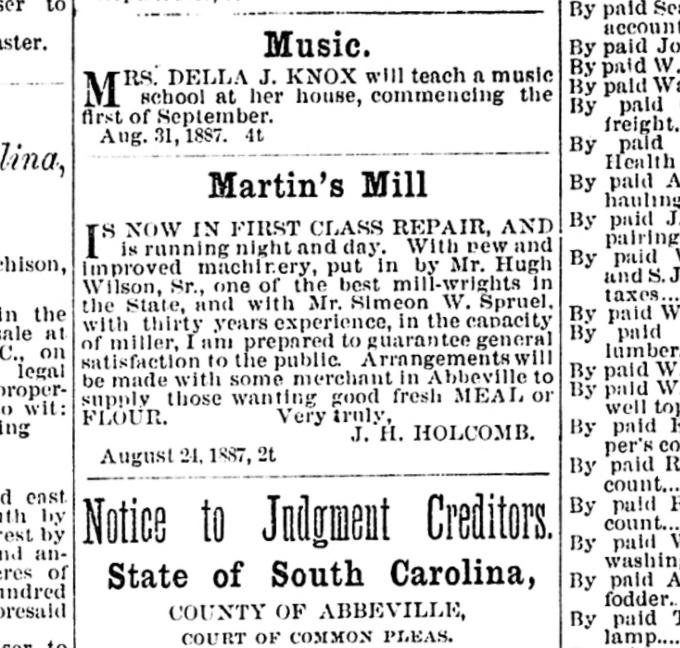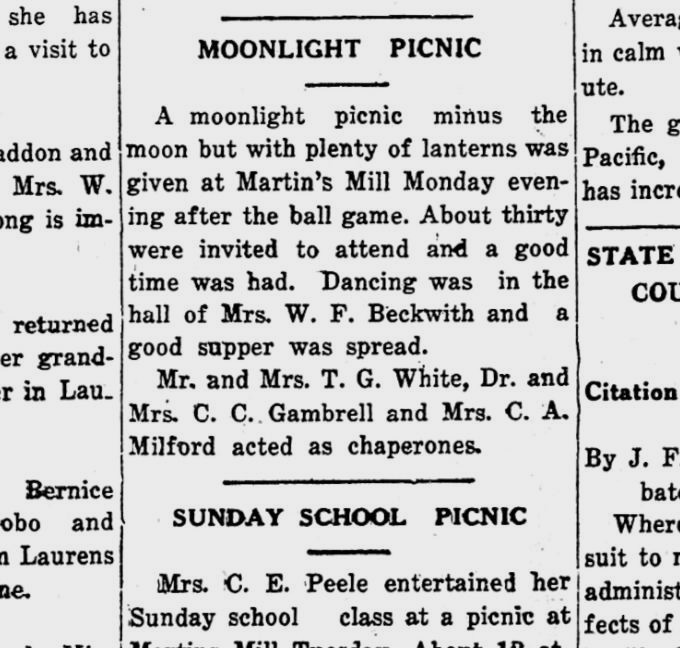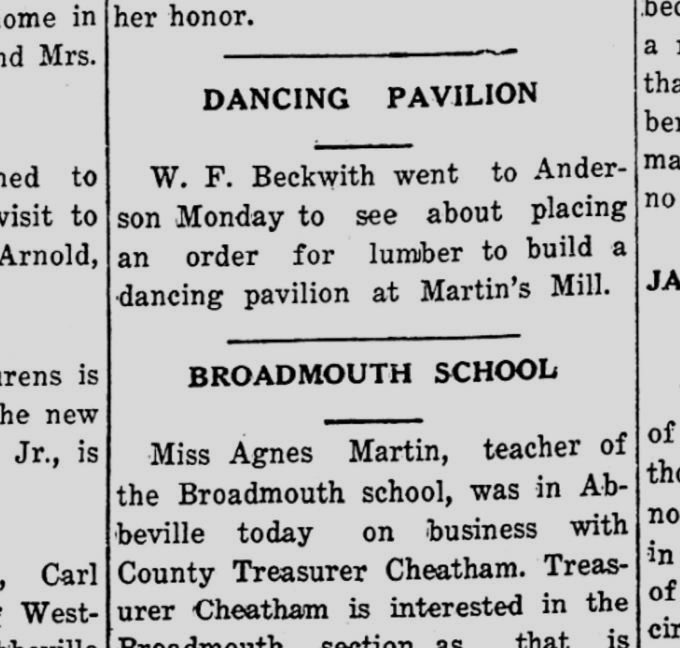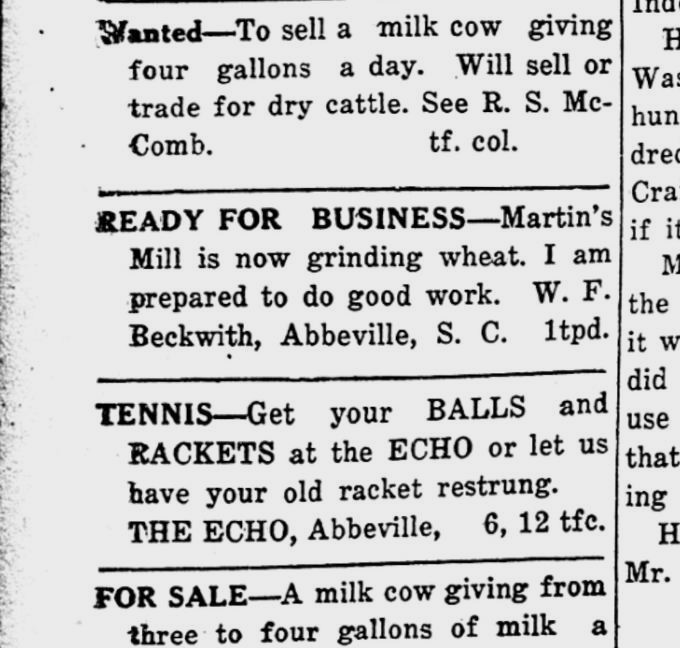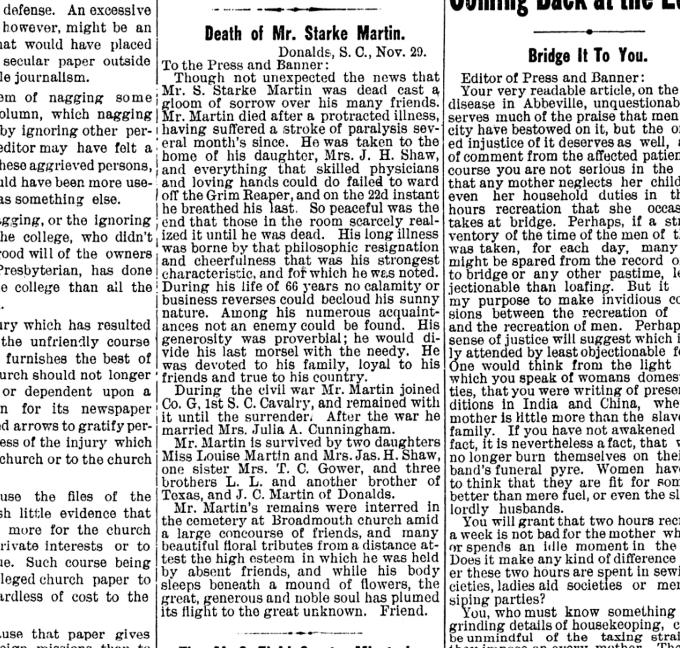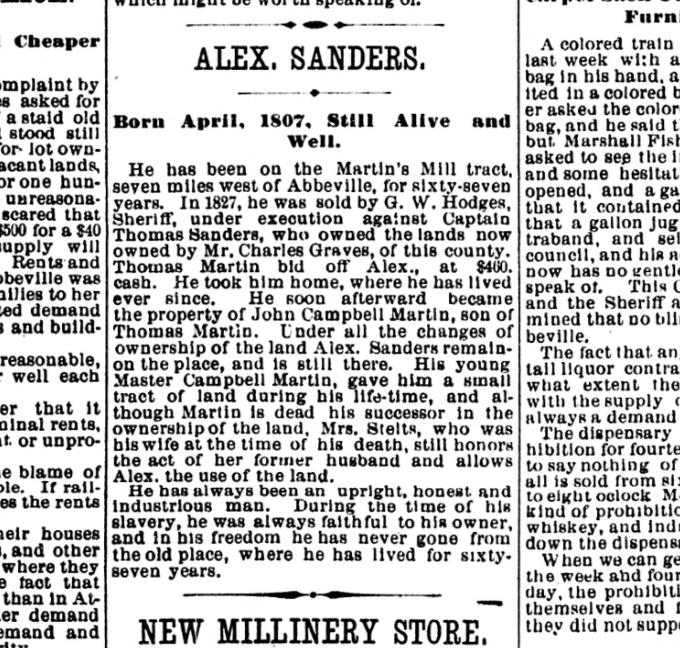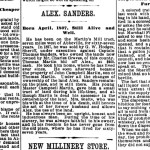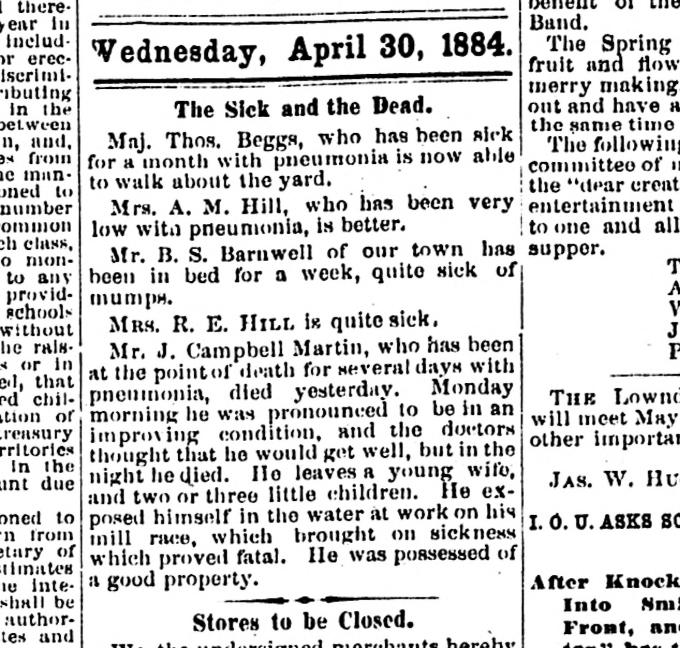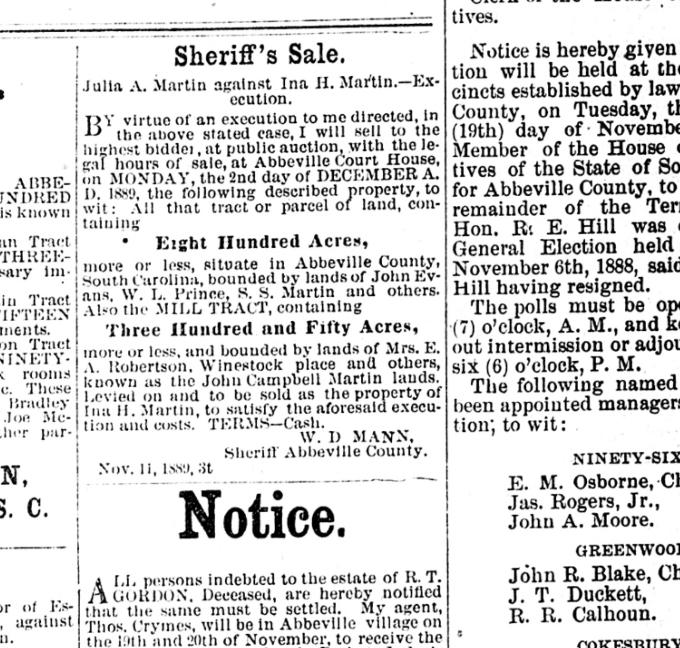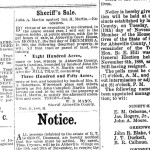Originally printed in Abbeville’s Press and Banner, February 23, 1881. Reprint: The Anderson intelligencer. (Anderson Court House, S.C.), 03 March 1881. Chronicling America: Historic American Newspapers. Lib. of Congress. <http://chroniclingamerica.loc.gov/lccn/sn84026965/1881-03-03/ed-1/seq-1/>
Sent to me from Dr. Lowry Ware in January 2013
The Murder of Caroline Farrow
Abbeville is again the scene of crime and bloodshed–a crime for which the history and traditions of a county are famous in the past for law and order, furnish no parallel. It seems from the testimony taken at the Coroner’s Inquest that on the night of Friday, the 18th instant, some Negroes undertook to have a candy pulling at the house of Sarah Martin, on the plantation in possession of Mr. Stark Martin, that owing to the presence of Mr. William Bee Martin that intention was abandoned; that Mr. Martin the same night forced open the door of Caroline Farrow’s house, while she was dressing, that she took flight from the house in the darkness and secreted herself for a time; that she afterwards went to the house of Cornelius Matthews; that in about a half or three-quarters of an hour from that time the muzzle of a gun was seen projecting through a crack between the logs of the house in which she had taken refuge; that a voice from the outside, believed to be that of Mr. William Bee Martin, said: “Take care, I’ve got you now.” At that instant the gun fired, and the whole load of shot lodged in the hip of Caroline Farrow, who was standing perhaps four or five feet from the muzzle of the gun when it was discharged. She fell upon the floor on her face. There was a commotion about the house, not unnatural to the occurrence of such an event; one of the men went into the yard; the figure of a man supposed to be that of Mr. William Bee Martin, was seen to mount a horse, which had been hitched nearby, after which he rode away, rapidly.
The evidence at the Coroner’s inquest was solely in behalf of the State. The Coroner does not undertake to investigate the merits of the crime, and hence no evidence was taken in the interest of the accused. In the absence of any testimony, we thought it well to offer his brother an opportunity to say a word in his behalf. In reply, Mr. J. Campbell Martin protested that his brother was innocent; that he was at his house, in bed and asleep at the hour, when the shooting was done.
It is not our province to pronounce judgment as to whether either the evidence before the jury or the statement of Mr. Martin are true or untrue. We give them publicity for what they are worth, and will allow the reader to form his own conclusion as to the guilt or innocence of the accused. About one fact, however, we think there can be no doubt—that a most foul and base deed has been committed. The heart shrinks from the contemplation of the killing of any human being in the manner by which the life of Caroline Farrow was taken, and the quiet inoffensive citizen must feel to a greater degree the doubt as to the personal safety in a country where such crimes occur. The public are familiar with many of the facts concerning the various crimes which have blackened the history of Abbeville
County within the last few years, but we look in vain for one of greater atrocity, or one more likely to give our people a feeling in insecurity, even while around their own fireside. The muzzle of an unfriendly shot gun peering through the cracks of one’s house, is not of the nerve quieting order, and although the Governor of the State has seen fit, in his wisdom, to pass unnoticed the crime at Maddox’s Mill, where Mr. William Maddox was called to his door last November, in the night time and murdered, it is to be hoped that he will not be slow to see that the detective and State officers shall do their whole duty in this matter. Coroner J. A. Shellito so far, has discharged his duty fully, and he informs us that he will today comply with the requirement of the Jaw, and send to the Governor the evidence taken at the inquest. If the Governor will let people who may be contemplating cold blooded murder, know that the power of the State would be brought against them, it is fair to presume that crimes of this kind would be fewer. In no county have we had a greater number of cold blooded murders than in Abbeville. The Harmons, the Franklins, William Maddox, and now Caroline Farrow, all murdered in cold blood while in their own houses.
For years the juries in Abbeville have been exceedingly lenient towards persons charged with crimes against the person, and we are now reaping the evils of that sickly sentimentality which shrinks from meting out a just punishment for crime. Is there not a limit, beyond which, the forbearance of our people will not go? Is there not a time when they will assert that crime shall stop?
Coroner’s Inquest. The Jury Say that Caroline Farrow came to her death at the hands of William Bee Martin. Last Saturday it was rumored on our streets that a Negro woman had been shot and killed by William Bee Martin, on his farm about eight miles west of Abbeville Court House. Further information confirmed the fact of the shooting, but established the fact that she was still living. She died, however, about seven o’clock on Monday morning. Coroner J. A. Shillito summoned Deputy Sheriff J. Y. Jones to his assistance. Dr. Marshall of our town was notified that his services as an expert were needed. A few jurymen proceeded at once to the scene. In a little while representatives of the Press and Banner followed and all were soon on the ground, where we beheld the most ghastly wound on the person of Caroline Farrow that it is possible to conceive. The inquest was organized which brought out the following developments:
THE TESTIMONY
A. W. Thomas, sworn, said: Lived in the house where shooting occurred for the last two years; on last Friday night I was here at home in my house, and my wife and Cornelius Matthews and Sarah Matthews went over the creek to Mr. Stark Martin’s place, and when they came back Carrie Farrow came with them; just before they came back Mr. Bee Martin came to my door and called me three times, and I saw him. Mr. Martin said, “Thomas, I’ll kill you in the morning, God damn you, excepting God paralyzes me.” I never made no answer; he said it was an old grudge; these women and Cornelius Matthews came into the house; they were sitting by the fire; after sitting betwixt five and ten minutes, I got up and went to the door, came back and sat down, sat there betwixt a half and three quarters of an hour, I said to my wife, I believe I’ll go to bed, pulled off my clothes, went to bed and just as I Iayed down, I heard a voice said, “Take care, take care, God damn you, I’ve got you now,” a gun fired and Carrie fell; I jumped up out of the bed and hollered for Randall Mason to come here quick; when Randall came I saw a man going up through the old field; I was by the pig pen ten or fifteen steps from the retreating man; he was riding; the moon wasn’t up; I take the voice that said, “take care, take care, God damn you, I’ve got you now” to be the voice of Mr. Bee Martin; it was not too dark for me to see the horse; didn’t know whether he had a gun or not; he ran around the garden and got on his horse a little piece from the corner of the garden; he was just mounting and turned his horse as I saw him; couldn’t track to do any good on account of the rain after the shooting; I came back, made the alarm and sent for the doctor; I am satisfied it was Mr. Bee Martin that called me at the door the first time; didn’t come out of the door after Mr. Bee Martin threatened me; this is all I know about it; of my knowledge I know of no circumstances to connect Mr. Bee Martin with the shooting; the man riding off didn’t look like he had a hat on; my little boy found a hat next morning near the ladder leaning against the chimney; didn’t see the gun; there was a light; and Carrie Farrow was standing in front of fire; (hat exhibited) can’t say whose hat it is. A. W. Thomas Sarah Matthews, sworn, said: Lives in the house where the shooting occurred; was going over the creek to a candy pulling with my sister Amanda and my husband Cornelius Matthews; the candy pulling didn’t take place because Bee Martin was there; a great many people gathered; Carrie Farrow said she was afraid of Bee Martin and asked us to let her come back with us and stay all night with us; as we were coming home Bee Martin overtook us on the road; he rode up and said, “Manda, who are all these you’ve got here with you?” She said, “Sarah, Cornelius and amongst us;” Bee Martin asked where was Carrie; she told him she did not know; Bee Martin said, “all I want is to lay my eyes on her, God damn her, I’ll kill her before morning;” he passed still cursing and saying all he wanted was to see Carrie Farrow, God damn her, he would kill her before morning; Bee Martin came in front of my house and called my brother, A. W. Thomas, as high as three times; he said “Thomas, God damn you, I’ll kill you in the morning, excepting God paralyzes me;” he went on riding up the road; we all sat down in the house; and sister “Manda said to Carrie if she had eaten anything, she said no, I haven’t eat anything since night before last; I got up and gave her some molasses and bread, I turned to pour some milk out of the churn; the churn was in front of the fire, as I aimed to cover the churn, Bee said, “take care, take care, God damn you I’ve got you;” I was between the hole near the chimney and Carrie; I saw the gun and fell back; the gun went off and shot Carrie Farrow; the gun protruded into the house about four inches; I was so frightened I can’t say whether it was a double or single barrel gun; I am sure that it was the voice of Bee Martin that said, “take care, take care, God damn you, I’ve got you now”; I am sure he had no gun when he overtook us; he was riding a black horse; don’t know of my own knowledge why Carrie was scared of Bee; when we heard Bee coming from the candy pulling, we recognized Bee’s horse and heard him cursing, then Carrie Farrow hid in the pines; don’t know the hat exhibited to me; this is all I know about it.
Sarah Matthews.
Amanda Thomas, sworn, said: Lives in the house where the shooting occurred; on last Friday night Sarah and Cornelius Matthews went over the creek to a candy pulling; candy pulling didn’t go because Bee Martin was there; Carrie Farrow and Lindsay Wilson were to give it; Carrie Farrow said as Bee Martin had threatened her she was afraid and this was the reason it didn’t come off; Carrie Farrow said let me go home with you all and stay all night; I know that Carrie Farrow was under Sarah Martin’s house; she got under there to get out of Bee Martin’s way; when we arrived she came out; Bee Martin ran against Sarah Martin’s door and broke the fastening of the door; we all ran out, Carrie
Farrow with us; we came on back home and Bee Martin overtook us; Carrie Farrow dodged out in the pines; Bee Martin rode up and said ‘Manda, who are all of these you have got with you?;” I said, “Sarah and Cornelius and them’uns” he came on to my house and called my husband and said “Martin God damn you, I’ll kill you in the morning unless God paralyzes me.” Bee Martin then went on up the road; we came in and talked a while; I asked Carrie if she had eaten anything; I told Sarah Matthews to get up and give Carrie some bread; Sarah poured out the molasses; Carrie said “put it down, I’m not ready for it yet, Carrie asked for some bread and milk; I heard a voice at the chimney say, “look out, God damn you, I’ve got you now;” Carrie Farrow came in night clothes; she had been broken upon by Mr. Bee Martin while dressing for the candy pulling; just before hearing the voice at the chimney corner; she asked me to loan her one of my dresses; she walked to the fire and was buttoning up the basque; I heard the voice say, “look out, I’ve got you,” I heard the gun go off; I was frightened and didn’t give the alarm; Carrie Farrow whirled and fell t1at of her face; heard no more voices outside; I recognized the voice as that of Mr. Bee Martin; can’t tell whether Mr. Bee Martin was drinking or not; don’t know the cause of the fuss between Mr. Bee Martin and Carrie Farrow; Carrie told us Bee said if she reported him for beating her Monday night he would kill her; he tried in the village to get together she said, to make it up with him, and told her if she didn’t he would give her 20 lashes or kill her; Mr. Bee Martin has not been here since the shooting; don’t know whose hat the one shown me is; Mr. Martin had no gun when he passed me; the night was hazy and cloudy; he was riding his black horse Black Sally; this is all I know about it.
Amanda Thomas
Dr. J. W. W. Marshall, sworn, said:
Made a post mortem examination on the dead body of Caroline Farrow with Dr. D. Sloan Benson. Found a gun shot wound in the left hip two and a half to three inches in diameter. The shot passed through the hip bone, entered the cavity of the pelvis, and lodged in the pelvis. Did not cut any of the bowels nor the pelvic viscera. Found the shot in the hollow of the sacrum, small bird shot. Found on examination profuse internal hemorrhage had taken place from the effects of the gun shot wound. I suppose from the small shot taken out the wound, that it must have been inflicted by means of a shot gun .
J. W. W. Marshall, M.D.
Dr. D. Sloan Benson, sworn, said: I made the post mortem examination, in company with Dr. Marshall and corroborate above statement in every particular.
D. Sloan Benson, M.D.
The Verdict of the Jury, State of South Carolina
Abbeville County
An inquisition taken at the Martin plantation in Abbeville county, the 21st day of February, A. D., 1881, before J. A. Shillito, Coroner of said County, upon the body of Caroline Farrow of Abbeville County, S.C., then and there being dead, by the oaths of James A. Reid, E. B. Taylor, A. T. Fleming, Thomas Crawford, J. Thomas Fortescue, A. E. Lesly, E. Richey, B. W. Williams, T. P. Millford, R. A. Richey, G. C. Dusenberry, J. H. Walker, being a lawful Jury of Inquest, who being charged and sworn to enquire for the State of South Carolina, where and by what means the said Caroline Farrow came to her death by a gun shot wound inflicted upon her on the night of Friday the eighteenth day of February, A. D. 1881, and that said shot was fired by W. B. Martin, and so the Jurors aforesaid, upon their oaths aforesaid do say that the aforesaid W. B. Martin in manner and form aforesaid Caroline Farrow then and there feloniously did kill, against the peace and dignity of the same State aforesaid.
J. A. Shillito, C. A. C.
Statement of J. Campbell Martin
Jas. A. Reid, Foreman
A. E. Lesly
J. H. Walker
T. P. Milford
Thomas Crawford
A. T. Fleming
E. B. Taylor
ED. Richey
J. T. Fortescue
Beny. W. Williams
G. C. Dusenberry
R. A. Richey
In an interview with Mr. J. Campbell Martin, brother of the accused, he made the following statement: “My brother, William B. Martin, denies committing the deed, and I believe my brother’s statement as to his innocence. You have no doubt observed that the witnesses testify that the deed was done about nine o’clock. My brother was at my house in bed asleep at that hour. He is not going away. He will stay and stand his trial if indicted. I do not care to say why he is not here to-day. This is all I have to say.
Dissatisfaction Among the Negroes.
Hearing that the Negroes were dissatisfied at the fact that William Bee Martin had not been arrested, and learning that the rumor was current among them to the effect that Trial Justice Calhoun had on Saturday last refused to issue a warrant for his arrest, although the accused was in town on that day. We called at the Justice’s office where we were furnished with a copy of the following:
State of South Carolina
Abbeville County
Affidavit
Personally appeared before me, Orville T. Calhoun, a Trial Justice of said State, Cornelius Matthews, who, being duly sworn, says: That at Abbeville, S.C., on or about the 18th February, 1881, Caroline Farrow, while in the house of Martin Thomas, was shot by someone on the outside of said house, through a crack in said house, that from information delivered from others and from facts which he knows of his own knowledge, he verily believes W. B. Martin is the person who shot the said Caroline Farrow, and prays that he may be apprehended and dealt with according to law.
his
Cornelius X Matthews
Sworn to before me this 19th February, 1881.
Orville T. Calhoun, Trial Justice, A. C.
Colonel Calhoun afterward kindly furnished the following statement as to the rumor, and we give the same in his own words; Mr. Calhoun said that after he had taken the above affidavit he asked the prosecutor if he had witnesses with him; that if he had, Martin was in town and he could go on with the case then. The prosecutor said he did not have his witnesses and would like to have the case put off until Monday. Mr. Calhoun agreed to this and asked for the names of the witnesses, and the prosecutor and those with him gave the following names: Mr. Kirby, Martin Thomas, Ephraim Martin, Sarah Martin, Jason Gray, Lindsay Wilson, Amanda Thomas, Sarah Matthews, and Phil Madden. Mr. Calhoun told the parties that he would send up on Monday morning for Martin and witnesses, and that they had better go on home as Martin was in town drinking, and some of them might get into a difficulty with him. They said they would go straight on home. Mr. Calhoun told them that if the girl should die before Monday morning they must inform the sheriff as soon as the girl died and he would have Martin arrested, and they said they would do so. Mr. Calhoun says he heard late on Saturday that the girl was dead, and that the sheriff had sent Mr. J. Y. Jones to arrest Martin, but that he saw a brother of the girl soon afterward and was told by him that his sister was not dead but very low. He told him if his sister should die, to inform the sheriff and he would arrest Martin and he said he would. On Monday morning he was informed that the girl was dead and Mr. Jones had been sent to arrest Martin. He got this information from the sheriff, and was told by the sheriff at the same time that he had sent Jones to arrest Martin on Saturday evening, but he had failed to arrest him.
The Accused
The accused is a descendant of one of the old and well-known families of Abbeville County, and as a matter of course is related to a number of our citizens. His father was John Campbell Martin, senior, who died on his farm, seven miles west of Abbeville Court House, in 1854, one of the wealthiest men in the county at that time. Besides being the owner of thirty-five hundred acres of land, he possessed more than one hundred slaves, together with all the implements and stock incident to the conduct of a farm of this size. The accused and his brother, J. Campbell Martin, inherited the water power and about two thousand acres of the land. On this valuable property the two brothers, being the youngest of the family, reside. The accused is an unmarried man, aged 26 years, and lives alone in a little log house on the farm on the east side of the river and near the mill.
The Deceased
Caroline Farrow, the deceased, was a Negro woman of perhaps thirty-five years of age, and leaves a number of little children.

